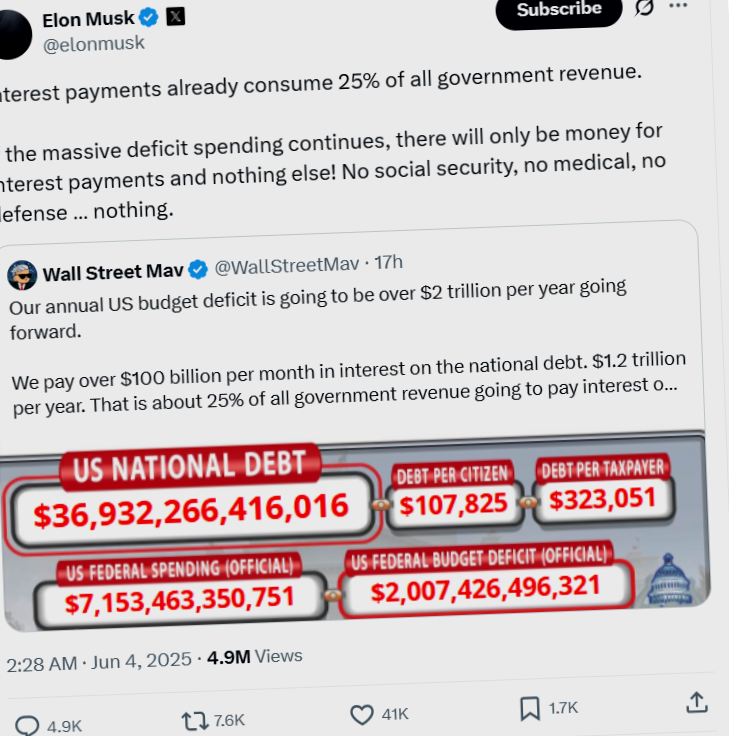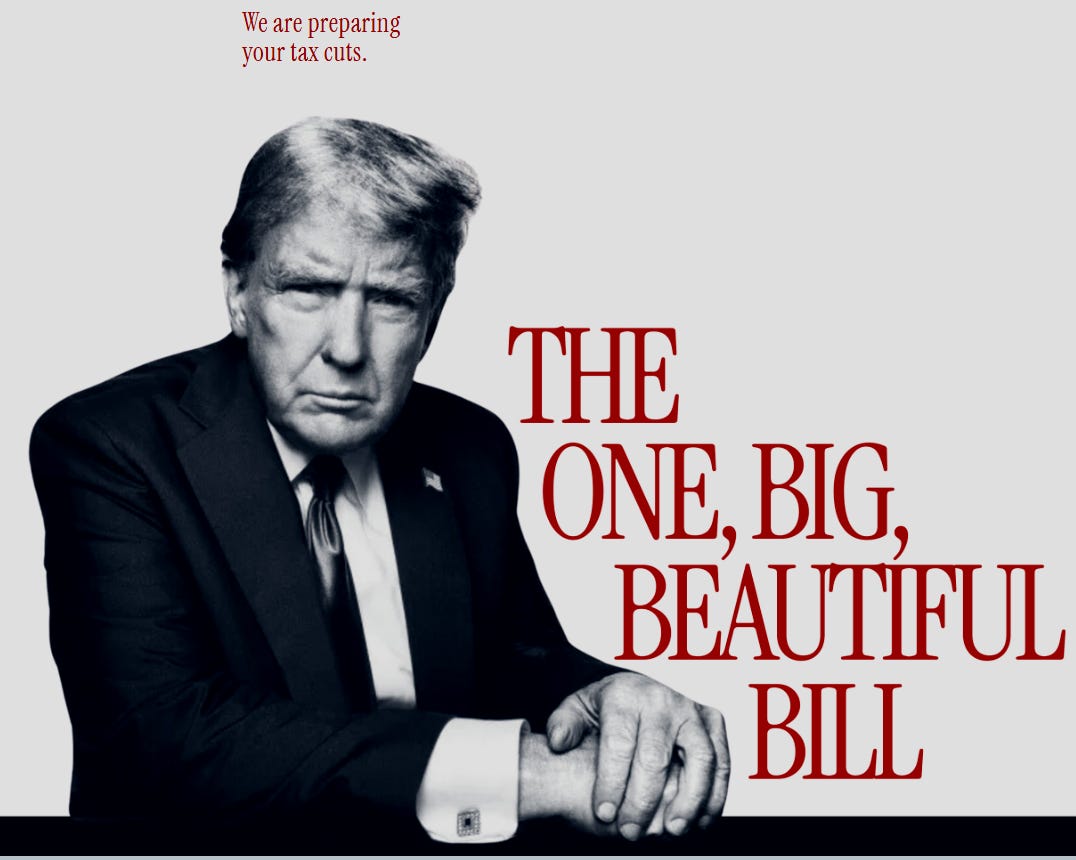Elon Musk Slams Trump’s “One Big, Beautiful Bill” as “Disgusting Abomination” Over Deficit Concerns
Elon Musk has ignited a firestorm of political controversy with a series of scathing social media posts denouncing the latest Congressional Budget Bill.

Billionaire entrepreneur and former Trump administration advisor Elon Musk has ignited a firestorm of political controversy with a series of scathing social media posts denouncing the latest Congressional spending bill, officially titled the “One Big, Beautiful Bill Act,” currently being backed by US President Donald Trump.
As outlined in the June 4th, 2025 Reuters post, “Musk calls Trump's tax-cut and spending bill 'a disgusting abomination',” the billionaire entrepreneur, who until recently led the US Department of Government Efficiency (DOGE), called the legislation a “disgusting abomination” and accused lawmakers of burdening Americans with “crushingly unsustainable debt.”
His outspoken criticism, primarily voiced on his social media platform X, has deepened a rift with the Trump administration and emboldened fiscal conservatives in Congress, while drawing unexpected support from Democrats opposed to the bill.

On June 3rd, 2025, Musk took to X to express his frustration with the spending bill, which narrowly passed the House of Representatives in late May by a single vote.
In a post that garnered over 5.5 million views within an hour, Musk wrote, “I’m sorry, but I just can’t stand it anymore. This massive, outrageous, pork-filled Congressional spending bill is a disgusting abomination. Shame on those who voted for it: you know you did wrong. You know it.”
The Tesla and SpaceX CEO followed up with a series of posts amplifying his concerns, warning that the bill “will massively increase the already gigantic budget deficit to $2.5 trillion (!!!) and burden America citizens with crushingly unsustainable debt.”
In another post, he declared, “Congress is making America bankrupt,” and suggested that voters should “fire all politicians who betrayed the American people” in the 2026 midterm elections.

Musk continued his comments on June 4th, highlighting the broader fiscal implications of unchecked deficit spending.
“Interest payments already consume 25% of all government revenue,” Musk wrote on “X,“ then went on to state:
If the massive deficit spending continues, there will only be money for interest payments and nothing else! No social security, no medical, no defense … nothing.
These posts reflect Musk’s long-standing concern about the US national debt, which he views as an existential threat to the country’s economic stability.

Musk’s objections center on the bill’s failure to align with the cost-cutting mission he championed at DOGE.
During his 129-day tenure as a special government employee, Musk led efforts to slash federal spending, claiming $160 billion in cuts and the elimination of 20,000 federal jobs—approximately 1% of the federal workforce.
Musk had previously estimated that DOGE could save $2 trillion, a goal he argued was undermined by the “One Big Beautiful Bill” and its deficit-expanding provisions.
As outlined in the June 1st, 2025 CBC News post, “Elon Musk on DOGE and why he doesn't want to "take responsibility for everything the administration's doing," Musk expressed disappointment in the massive spending bill which, “increases the budget deficit, not just decreases it, and undermines the work that the DOGE team is doing.”

Musk’s comments have reverberated across Washington, exposing divisions within the Republican Party and complicating the bill’s path through the US Senate, where GOP leaders aim to pass a revised version by July 4th.
House Speaker Mike Johnson, a key architect of the bill’s passage in the US House of Representatives, expressed surprise and disappointment at Musk’s stance.
“With all due respect, my friend Elon is terribly wrong about the One Big, Beautiful Bill,” Johnson told reporters on June 3rd, noting that he had spoken with Musk for twenty minutes the previous day to discuss the legislation’s merits.
Johnson speculated that Musk’s criticism might stem from the bill’s elimination of electric vehicle tax credits, which could impact Tesla’s bottom line.
“I know that has an effect on his business, and I lament that,” Johnson added, while defending the decision to end such subsidies.
Senate Majority Leader John Thune, tasked with shepherding the bill through the Senate, took a more diplomatic tone, acknowledging Musk’s contributions at DOGE while dismissing his concerns as a “difference of opinion.”
Thune suggested that Musk’s deficit projections relied on outdated Congressional Budget Office data and argued that the bill’s tax cuts would spur economic growth to offset its costs.
White House Press Secretary Karoline Leavitt echoed this sentiment in a June 3rd, press conference. According to Leavitt, “The president already knows where Elon Musk stood on this bill. It doesn’t change the president’s opinion. This is one big, beautiful bill, and he’s sticking to it.”
Despite these defenses, Musk’s criticism has emboldened fiscal hawks within the GOP.
Senators Rand Paul (R-Ky.), Ron Johnson (R-Wis.), and Mike Lee (R-Utah) have aligned with Musk, arguing that the bill fails to address the nation’s $36.2 trillion debt.
Paul, who has faced Trump’s ire for opposing the debt ceiling increase, wrote on X, “I agree with Elon. We have both seen the massive waste in government spending and we know another $5 trillion in debt is a huge mistake. We can and must do better.”
Lee called for the Senate to “make this bill better,” while Johnson threatened to withhold his vote unless deeper spending cuts are included. In the House,
Representatives Thomas Massie (R-Ky.) and Warren Davidson (R-Ohio), who voted against the bill, have also endorsed Musk’s stance.

Musk’s outspokenness has also encouraged an unlikely alliance with Democrats, who have seized on his comments to bolster their opposition to the bill.
The June 3rd, 2025 C-Span post, “Senator Schumer Says He Agrees With Elon Musk on Cost of Tax and Spending Cuts Bill,” notes Senate Minority Leader Chuck Schumer’s recent comments at a press conference, “I didn’t think it was imaginable, but I agree with Elon Musk.”
Schumer argued that the bill’s cuts to Medicaid and SNAP, which the CBO estimates could result in 7.6 million Americans losing healthcare coverage, prioritize tax breaks for the wealthy over the needs of ordinary citizens.
House Minority Leader Hakeem Jeffries echoed this sentiment, quipping, “Breaking news: Elon Musk and I agree with each other.”
But its worth noting that, unlike Musk, the Democratic leaders aren’t arguing for a smaller bill; they’re just arguing for more spending in different areas.

Musk’s intervention comes just days after his planned departure from the Trump administration on May 31st, 2025, following the expiration of his 130-day term as a “special government employee.”
His tenure at DOGE was marked by aggressive cost-cutting measures, including workforce reductions and agency restructuring, but drew criticism for alleged conflicts of interest and legal challenges.
Despite stepping down, Musk has vowed to remain an informal advisor to Trump, with whom he shared a cordial Oval Office news conference on May 30th.
As one of Trump’s top financial backers, having spent nearly $300 million on the 2024 election cycle, Musk’s influence remains significant.
His threat to support primary challenges against Republicans who back the bill could pose a financial and political challenge for the GOP, particularly after Musk’s America PAC’s substantial contributions to Trump’s campaign.
The Senate’s consideration of the bill will test Musk’s political clout and the GOP’s ability to navigate internal divisions.
With fiscal hawks demanding deeper cuts and rural-state Republicans pushing to protect Medicaid, the path to passage remains uncertain. Trump’s insistence on meeting the July 4th deadline for passing the bill adds pressure, but Musk’s vocal opposition has thrown a “spanner into the works,” as one analyst noted.
As bond markets react to the prospect of rising deficits, with 30-year Treasury yields nearing 5%, the debate over the bill’s fiscal impact is likely to intensify.
For now, Musk’s social media broadsides have reshaped the narrative around the “One Big, Beautiful Bill,” highlighting the tension between Trump’s ambitious agenda and the fiscal restraint Musk championed at DOGE.
Whether his criticisms will sway the Senate or further strain his relationship with the Trump administration remains to be seen.
Portions of this story were researched and structured using AI, but Freedom Forum still hopes this post is helpful and informative.
If you agree, please support Freedom Forum’s sponsors by clicking on the images below.





